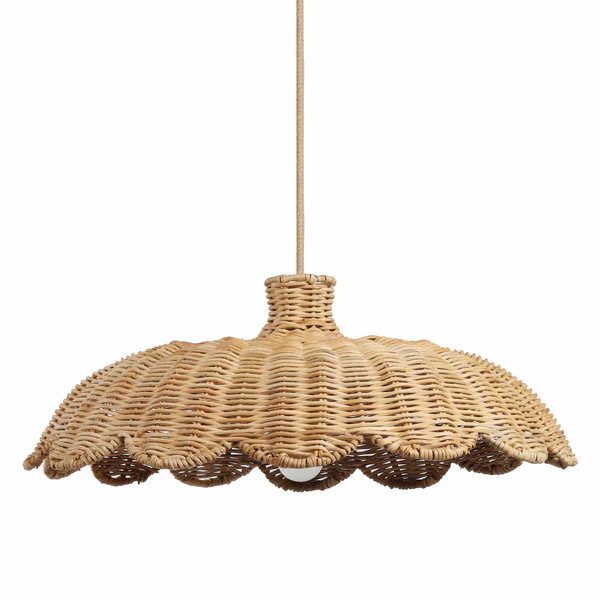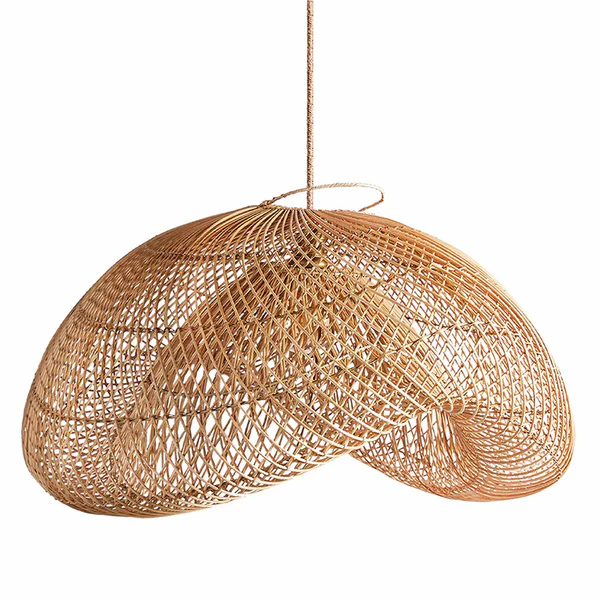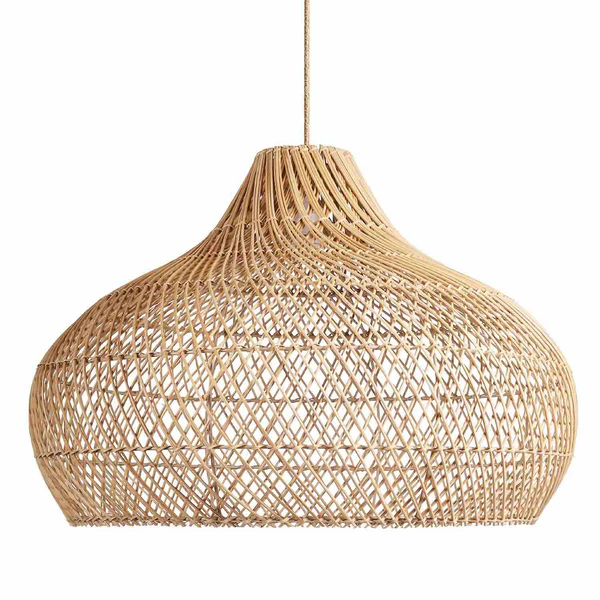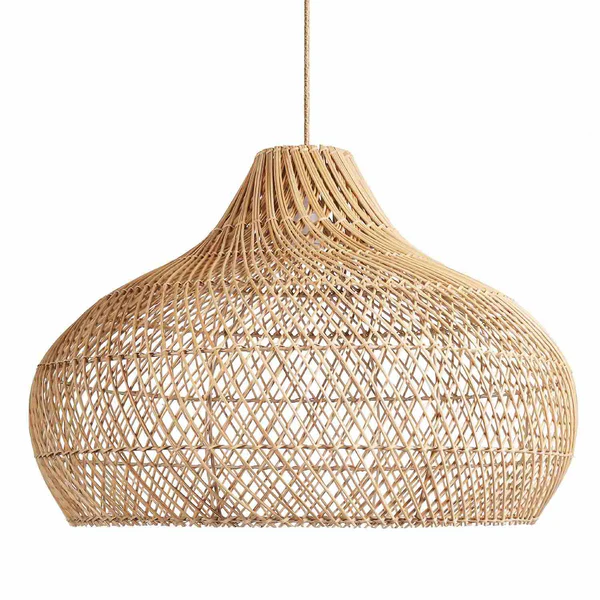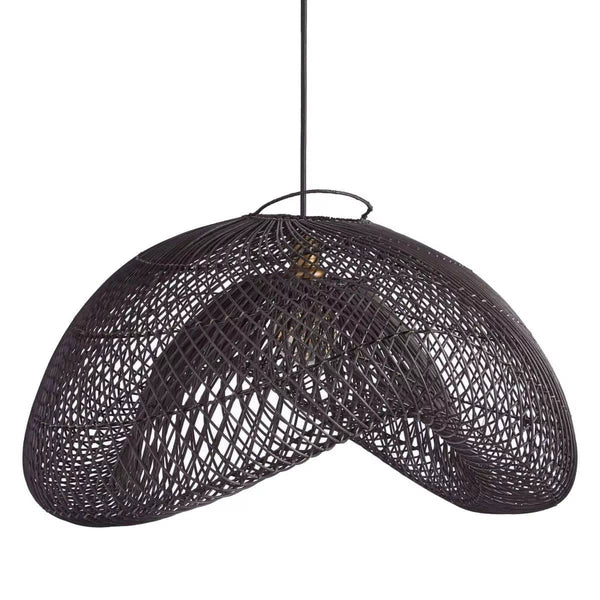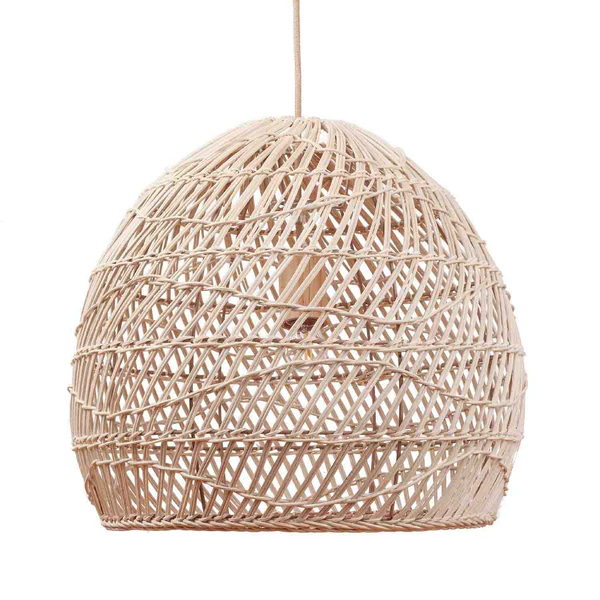Welcome to Lighting a Greener Future! Today, we’re thrilled to explore the captivating world of handmade rattan pendant lights. These exquisite fixtures are more than just illumination – they’re a testament to artistry, sustainability, and timeless elegance.
The Artistry of Handmade Rattan Pendant Lights
Handmade rattan pendant lights embody the perfect fusion of form and function. They’re not just lights; they’re breathtaking works of art.
Craftsmanship and Traditional Techniques
Artisans weave rattan strands into intricate patterns. Each woven shade tells a story of skill passed down through generations. The attention to detail in these lights is awe-inspiring.
Design Versatility: From Boho to Modern
Rattan pendant lights adapt to various interior styles. They bring rustic charm to bohemian spaces and add organic texture to modern rooms. Their natural fibers create a warm glow that transforms any environment.
These versatile fixtures complement industrial lofts and minimalist apartments alike. The natural material softens harsh lines and adds depth to sleek spaces. It’s no wonder that experts highlight their adaptability across design spectrums.
The Intricate Weaving Process
The creation of a rattan pendant light is a mesmerizing dance of skill and patience. Artisans carefully select and prepare rattan strands. They then weave these strands into complex patterns.
This process can take days or even weeks. The result? A unique fixture that’s both a light source and a sculptural element. Each handwoven pattern is a fingerprint of its creator.
The weaving technique affects both aesthetics and function. Tighter weaves create denser shades for focused light. Looser patterns allow for a more diffused, ambient glow. This versatility in light diffusion makes rattan pendants suitable for various lighting needs.
Sustainability and Eco-Friendly Lighting Solutions
Rattan pendant lights aren’t just beautiful – they’re a step towards a greener future. These fixtures embody sustainability from source to illumination.
Rattan as a Renewable Resource
Rattan grows rapidly and regenerates quickly. It’s a sustainable alternative to traditional materials. Harvesting rattan doesn’t damage the ecosystem, making it an environmentally conscious choice.
Environmental Impact of Natural Fiber Lighting
Natural materials like rattan have a lower environmental footprint. They require less energy to produce than synthetic options. Plus, they’re biodegradable at the end of their lifecycle.
Lighting specialists advocate for rattan due to its eco-friendly properties. It’s a choice that aligns with the growing consumer preference for sustainable products. In fact, about 70% of consumers prefer sustainable lighting options.
Misconception: Durability Concerns of Rattan
Let’s bust a myth: rattan is not fragile. It’s surprisingly strong and flexible. When properly cared for, rattan fixtures can last for years without significant wear.
This durability makes rattan pendant lights a wise investment. They’re not just a fleeting trend, but a lasting addition to your home. How’s that for sustainable decorating?
| Misconception | Reality |
|---|---|
| Rattan is fragile | Rattan is strong and flexible |
| Short lifespan | Can last for years with proper care |
| Limited style options | Versatile across design styles |
Biodegradable Materials in Lighting Design
At the end of their life cycle, rattan pendant lights return to the earth. This natural lifecycle sets them apart from synthetic lighting options. It’s a small but significant step towards reducing our environmental impact.
Functional and Aesthetic Benefits
Handmade rattan pendant lights are more than just pretty faces. They bring a host of functional benefits to your space.
Creating Ambiance with Diffused Illumination
Rattan’s natural texture creates a soft, warm glow. Light filters through the woven strands, casting intricate shadows. This diffused light creates a cozy, inviting atmosphere in any room.
Textural Elements in Interior Design
Rattan pendant lights add visual interest to your space. Their organic texture contrasts beautifully with smooth surfaces. This interplay of textures adds depth and character to your interior design.
The natural fibers of rattan bring a touch of the outdoors inside. They create a connection with nature, even in urban environments. This biophilic element can have a calming effect on your space.
Rattan’s texture also makes it an excellent acoustic element. The woven structure helps to absorb sound, reducing echo in large or minimalist spaces. It’s a subtle but effective way to improve the comfort of your room.
Acoustic Properties of Woven Fixtures
The intricate weave of rattan pendant lights does more than just look good. It acts as a natural sound diffuser. This property can help create a more pleasant acoustic environment in your space.
Large, open rooms often suffer from echo and reverberation. A rattan pendant light can help mitigate these issues. The woven structure breaks up sound waves, reducing harsh echoes.
This acoustic benefit is especially valuable in modern, minimalist interiors. These spaces often have hard surfaces that reflect sound. A rattan pendant light adds a softer element that can improve the overall acoustic comfort of the room.
Market Trends and Consumer Preferences
The popularity of handmade rattan pendant lights is soaring. Let’s explore why these fixtures are capturing hearts and homes worldwide.
Growing Demand for Artisanal Lighting
Consumers are increasingly drawn to unique, handcrafted items. Handmade rattan pendant lights fit this trend perfectly. Each piece is a one-of-a-kind creation, appealing to those seeking individuality in their decor.
Price Points: Handcrafted vs. Mass-Produced
Handmade rattan pendant lights often command higher prices than mass-produced alternatives. But consumers are willing to pay for quality and uniqueness. These artisanal pieces can fetch 30-50% more than their factory-made counterparts.
Why the premium? It’s all about the craftsmanship. Each handmade light represents hours of skilled labor. The uniqueness of each piece adds value that mass production can’t replicate.
Despite the higher price point, demand for these lights is growing. The global rattan furniture market, including pendant lights, is projected to grow at a CAGR of 5.5% from 2023 to 2030. This growth indicates a strong consumer appetite for handmade rattan products.
Customization Options for Unique Spaces
One of the most exciting aspects of handmade rattan pendant lights is the potential for customization. Many artisans offer bespoke services, allowing customers to tailor their lights to their specific needs and preferences.
This customization can include:
- Size adjustments
- Unique weave patterns
- Color variations
- Shape modifications
The ability to create a truly unique piece is a major draw for many consumers. In fact, up to 80% of handmade rattan pendant lights sold are tailored to specific customer requests. This level of personalization is rarely available with mass-produced lighting options.
Illuminating Spaces: From Concept to Installation
Choosing and installing the perfect handmade rattan pendant light is an exciting journey. Let’s walk through the process together.
Selecting the Perfect Handmade Rattan Pendant Light
Choosing a rattan pendant light is a delightful process. Consider the size of your space and the desired light output. Think about the existing decor and how the light will complement it.
Remember, these lights are statement pieces. They can serve as a focal point in your room. Don’t be afraid to go bold with size or design!
When selecting your light, consider:
- Room size
- Ceiling height
- Desired light intensity
- Existing decor style
- Color scheme
Proper Care and Maintenance for Longevity
To keep your rattan pendant light looking stunning, regular care is essential. Dust it gently with a soft brush or use a low-power vacuum with a brush attachment. Avoid water or harsh cleaning products, as these can damage the natural fibers.
In case of stubborn dirt, a slightly damp cloth can be used. But be sure to dry the rattan thoroughly to prevent mold growth. With proper care, your handmade rattan pendant light will continue to illuminate your space beautifully for years to come.
The Global Impact of Rattan Craftsmanship
The world of handmade rattan pendant lights extends far beyond our homes. It’s a global industry with far-reaching impacts.
Supporting Artisan Communities Worldwide
The production of handmade rattan pendant lights supports artisan communities around the world. In Indonesia alone, over 1 million handmade rattan items are produced annually. This industry provides livelihoods for skilled craftspeople and helps preserve traditional techniques.
Innovative Designs Merging Tradition with Modernity
While rooted in tradition, rattan craftsmanship is constantly evolving. Contemporary designers are pushing the boundaries of what’s possible with this versatile material. They’re creating lights that honor traditional techniques while embracing modern aesthetics.
This fusion of old and new is creating exciting new possibilities in lighting design. It’s breathing new life into an ancient craft and ensuring its relevance in the modern world.
Lighting a Greener Future: Eco-Conscious Pendant Options
At Lighting a Greener Future, we’re passionate about sustainable lighting solutions. Handmade rattan pendant lights perfectly align with our mission. They’re eco-friendly, beautiful, and support traditional craftsmanship.
These lights represent a perfect balance of form, function, and sustainability. They prove that we don’t have to sacrifice style or quality to make environmentally conscious choices.
As we look to the future of lighting design, handmade rattan pendant lights shine brightly. They offer a way to illuminate our spaces that’s kind to the planet and supports global artisan communities. Isn’t it time we all considered lighting a greener future?
What’s your experience with handmade rattan pendant lights? Have you considered adding one to your space? We’d love to hear your thoughts and experiences in the comments below!
Remember, every light we choose is a step towards shaping our environment. Why not make it a step towards a more sustainable, beautiful world? The choice is illuminating!

